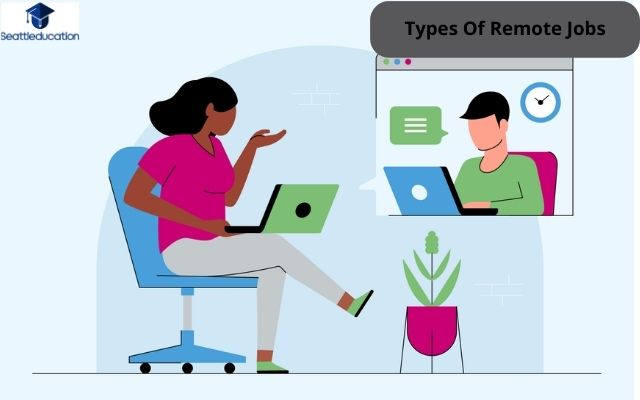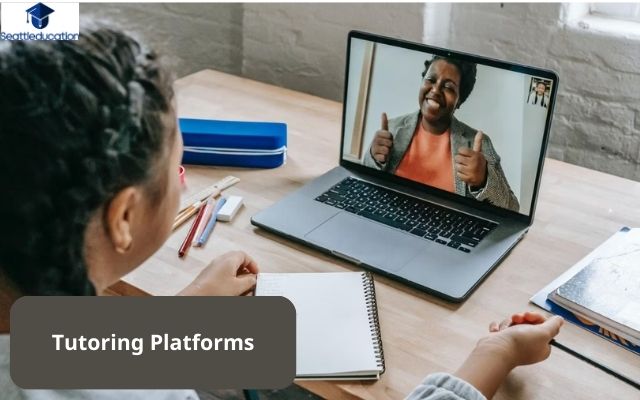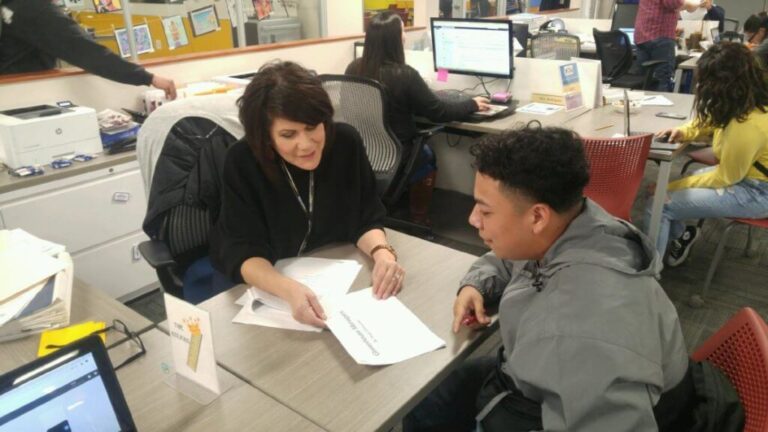Remote Jobs For Former Teachers: Opportunities & Challenges
Remote Jobs For Former Teachers: As a former teacher, I know how challenging it can be to find work after leaving the teaching field. But there is good news: remote jobs for ex-teachers are on the rise! With more and more companies offering flexible working arrangements, teachers who have left the classroom now have access to an array of new opportunities that allow them to transition into other fields while still taking advantage of their skills and experience as educators.
In this article, we’ll look at some of these options and explore how they might benefit former teachers looking for something different from their previous career path.
Let’s get started!
Qualifications For Remote Jobs
As a former teacher, I understand the challenges of transitioning from an in-person to remote job. The most important thing for me was to conduct a self assessment and determine my qualifications for such positions.

With experience teaching both in physical classrooms and virtual ones, I had plenty of resources available to help with my job search. I also took advantage of certification programs that provided additional training on how to effectively use online resources when teaching remotely.
This allowed me to quickly become comfortable using various platforms and applications specifically designed for distance learning environments. It’s been incredibly empowering having these tools at my disposal as I continue my career transition.
My journey so far has made it clear that adapting is key if you want to succeed in this new world of work – something all former teachers should be mindful of during their own job searches. As I move forward, I know there are different types of remote jobs open to those who have the right skillset and technical expertise…
Types Of Remote Jobs
Are you a former teacher looking to transition into the world of remote jobs? If so, you’re in luck! There are numerous opportunities for educators who want to make use of their skills and experience from teaching, but now work remotely.

From educator networking sites that focus on virtual instruction to more traditional roles providing classroom support or career coaching at an educational institution, there are plenty of ways to take advantage of your expertise without having to step foot inside a physical school building.
Here are some popular options for teachers seeking out remote education positions:
- Educator Networking Sites – These websites provide job listings, resources and help guide users through different aspects related to virtual instruction.
- Remote Education Positions – Many schools offer various types of remote education positions such as curriculum development, tutoring services or assessment evaluation.
- Career Coaching – This type of role typically involves offering advice and guidance on how to create successful learning plans or curriculums beyond the traditional classroom setting.
No matter what route you choose, transitioning into a new career can be daunting but with the right preparation it doesn’t have to be. With these tips in mind, you’ll soon find yourself well on your way towards discovering rewarding opportunities in the realm of remote jobs for former teachers.
Curriculum Development
Making the switch from a teaching job to working remotely can be daunting. Fortunately, there are many remote jobs available for former teachers that allow them to continue their passion and stay connected with their students. From curriculum development to online tutoring, here is an overview of some of the options.
Curriculum Development offers former teachers the opportunity to use their experience in designing academic programs, lesson plans, and other educational materials. Professional networking and career advice sites like LinkedIn provide access to employers looking for skilled professionals who understand how to design curriculums for different learning styles and environments.
Additionally, resume building websites offer Pe Teacher Certification templates specifically designed for education-based resumes which may help when seeking out these positions. For those interested in providing remote training or online resources, there are numerous opportunities available as well.
Many organizations have embraced digital tools that enable instructors to teach classes virtually or offer mentorship on certain topics without having to meet face-to-face. There are also several online courses and webinars tailored towards helping educators transition into new roles such as content writing or instructional design so they can hone their skills further while working remotely.
The possibilities of transitioning into a successful remote job after being a teacher don’t end here; next up we’ll explore what it takes to become an online tutor–another great option!
Online Tutoring
Online tutoring is a great option for former teachers looking to make use of their expertise in remote jobs. It offers the opportunity to work with students from all over the world, and allows them to craft individualized instruction plans with positive reinforcement and clear expectations.
Professional development opportunities can come through teaching new technologies while fostering time management skills that are mandatory for successful outcomes in any classroom. Teacher training options can also be offered via online tutoring as well, allowing educators to stay up-to-date on best practices and incorporate modern strategies into their virtual classrooms.
Additionally, since many traditional school systems have moved towards an online format due to coronavirus related health concerns, this type of job provides an opportunity to practice classroom management in a different modality than what they may already be used to.
Educational consulting requires a more comprehensive approach when compared to online tutoring as it encompasses multiple disciplines within the field of education such as curriculum design, assessment methods, instructional technology integration and professional learning communities.
The consultant must possess advanced communication abilities in order to effectively collaborate with various stakeholders involved in the process including administrators, parents/guardians and other professionals who interact daily with students.
A deep understanding of educational theories is necessary as well so that effective solutions can be provided which will meet each situation’s unique needs. Furthermore, consultants should have prior experience working directly with learners which enables them to better understand how certain changes may affect student success rates or teacher performance evaluations.
Moving ahead then into this next section about ‘educational consulting’, we’ll explore further how these roles differ from those previously discussed.
Educational Consulting
As a former teacher, you can use your knowledge and expertise to transition into educational consulting. With this career path, you’ll be able to help others achieve their goals without leaving the comfort of home.
As an educational consultant, you’ll provide career guidance, job search assistance, interviewing techniques for success, resume writing advice, and networking strategies so that individuals can find roles that best suit them. The beauty of remote work is that it allows flexibility – something many teachers are familiar with in terms of planning lessons and accommodating student needs.
You will have the freedom to structure your day around advising clients on how they can build upon their individual strengths while also getting financial remuneration in exchange for your services. Educational consultants play a key role in helping those who are looking for new opportunities or transitioning from one job to another gain insight into what employers seek today.
Through tips like honing their interview skills or creating well-crafted resumes tailored to specific jobs, you can give people the tools needed to stand out in a competitive market. Your experience as an educator sets you up perfectly to guide others through every step of their journey towards landing fulfilling positions.
From there we move onto freelance writing: A great way to make money online by leveraging your unique voice…
Freelance Writing
As many former teachers explore the idea of transitioning to a remote job, freelance writing is an option worth considering. Freelance writing can encompass several different projects and activities depending on each individual’s interests and experience.
From self publishing books to creating career coaching materials or offering editing services, there are plenty of ways for former teachers to use their expertise in this field. Additionally, university advising and corporate training are two other areas where freelancers may be able to capitalize on their knowledge base.
Freelance writing offers a wide variety of options when it comes to choosing tasks that align with one’s personal goals as well as financial needs. With the right resources – such as networking groups online or attending industry events – individuals can find success in building up a portfolio within any number of these avenues.
Moving onto virtual teaching now then; this too presents its own unique set of challenges and benefits for those interested in taking charge of their professional lives.
Virtual Teaching
As a former teacher, making the transition to remote work can be daunting. But with the right resources and training, you can easily become an effective virtual educator. Here are some tips for getting started:
- Get up to speed on virtual education tools and platforms such as Zoom, Google Classroom, or FlipGrid. Make sure you understand their capabilities and how they fit into your classroom management strategy.
- Take advantage of any available teacher training that focuses on distance learning techniques such as lesson planning, engaging student participation online, using multimedia effectively in instruction, etc.
- Join educator networks like Edmodo or Schoology where veteran teachers share best practices for teaching remotely. These communities provide invaluable support and advice when navigating this new world of virtual education.
With these strategies in place, you’ll have the skills needed to make a successful transition from brick-and-mortar classrooms to digital learning environments—providing students with quality educational experiences regardless of location!
Now it’s time to dive deeper into testing and assessment within a remote setting…
Testing And Assessment
I’ve noticed that while transitioning to remote learning, the importance of testing and assessment has become more important than ever before. As a former teacher, I can attest to the need for educators to understand how students are progressing in their studies and if they have learned the necessary material being taught. To do this properly, there needs to be an effective system of assessments, both online and offline.
With technology like virtual classrooms, we can create engaging activities that help measure student growth and development in social emotional learning as well as their comprehension of content-based topics.
It’s also important that parents play a role in understanding their child’s progress too – parent teacher communication is key here! Whether it’s through updates from teachers or regular check-ins with parents themselves, everyone should be invested in helping students excel during these times of remote learning.
It’s not always easy for either side so let’s make sure all stakeholders are included when discussing what type of assessments work best for each unique situation.
At the end of the day, our goal is to ensure every student gets access to quality education no matter where they’re located; whether its inside a classroom or at home due to COVID-19 restrictions. Let us continue on this journey by exploring educational technologies that could further support our learners improve their knowledge and skills.
Educational Technology
Now that we’ve discussed assessment and testing, let’s move on to educational technology. Technology has become an increasingly important and integral part of teaching in our modern world.
With blended learning, social media, e-books, virtual classrooms, and distance learning becoming more popular and accessible than ever before, teachers need to be aware of the opportunities available for them when job hunting remotely.

Educational technology can provide a vast array of resources with which teachers can draw from to enhance their students’ experiences both in the classroom and online. For example, by incorporating various forms of interactive media into their lesson plans such as podcasts or videos, teachers are able to engage with their students on a more personalized level which can lead to better student outcomes overall.
Additionally, utilizing platforms like Zoom or Google Classroom allows for greater collaboration between teacher and student even if they are not physically present in the same room together due to remote employment settings.
In terms of instructional design specifically, there is no one-size-fits all approach since every class will have its own set of unique objectives depending upon the grade level being taught or subject focus.
However, understanding how different technologies work together as well as identifying potential obstacles ahead of time can help former teachers create effective lessons that meet the needs of their current students while adhering to best practices laid out by their respective school districts or organizations. Onward now towards discussing instructional design!
Instructional Design
I’m excited to discuss instructional design as it relates to remote jobs for former teachers. Through my experience in eLearning platforms and course creation, I’ve found that there are many opportunities available when it comes to professional development. This includes educational research, teacher training, and content creation that can be done from anywhere with an internet connection.
When thinking about instructional design, the most important thing is understanding what the learner needs. It’s essential to create engaging experiences that not only motivate learners but also provide them with meaningful learning outcomes. Additionally, instructional designers must consider how technology can facilitate learning processes and experiences in order to maximize results.
To ensure successful instruction delivery, continuous professional development should be part of any instructional designer’s plan. Learning new technologies or methods related to designing courses helps keep up-to-date on best practices and industry trends. Overall, effective instructional design requires careful planning and consideration of each unique context. Moving forward into the world of content creation…
Content Creation
Now that you’ve learned about instructional design, let’s move on to Content Creation. Many former teachers who are looking for remote jobs have found success in this field. As someone with expertise in the education sector, you may already possess many of the skills needed to excel in content creation.
From networking opportunities and educational marketing to time management skills and professional development, there is a lot to learn and master when it comes to creating engaging content for distance learning solutions.
The great thing about content creation is that it offers plenty of flexibility as far as hours and location go. You can work from anywhere so long as you have an internet connection, which makes this type of job ideal for those seeking out remote employment options.
With your experience teaching students online, you’re well-positioned to take advantage of tutoring platforms or freelance writing gigs related to digital learning resources.
When entering into any new venture like content creation, organization is key! To get started, make sure that your portfolio is up-to-date with samples of your best work—whether they be stories, articles or blog posts—and keep track of deadlines while maintaining a steady workflow. Not only will these practices help sharpen your existing skills but they’ll also give you an edge over other applicants competing for the same position(s).
With all this in mind, we now turn our assistant jobs in kindergarten classrooms tutoring platforms – another avenue for utilizing your education background through working remotely.
Tutoring Platforms
I’m sure many former teachers can relate to the feeling of wanting to continue helping students, but not being able to do so in a classroom setting. Thankfully, remote jobs for former teachers offer an amazing opportunity to stay engaged with education and make a difference from anywhere.

Whether it’s tutoring platforms or other forms of distance learning, there are plenty of ways that educators can still utilize their skills and expertise while working remotely.
When considering these opportunities as a teacher, parental engagement is definitely something that needs to be taken into account. It’s important to think about how parents will be involved in the process when creating lesson plans and designing curriculums.
Additionally, student engagement should also be prioritized; making sure that all learners have access to solutions and strategies needed for success is essential no matter the environment.
Remote teaching provides great flexibility for both employers and employees alike. Of course, this type of job does come with its own set of challenges — especially when it comes to maintaining meaningful connections with students — however if done correctly, it can serve as an incredible opportunity for everyone involved.
Conclusion
It is clear that remote jobs for former teachers can be a great way to continue your career in education, while also providing the flexibility of working from home. With a good salary and potential for additional training, these positions offer many benefits.
It is important to look into the specific certifications required and if full-time or part-time work is available before applying for any job. While there are many different types of remote jobs available for former teachers, the most sought after position appears to be online teaching or tutoring.






